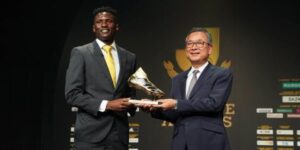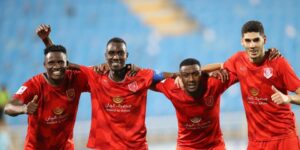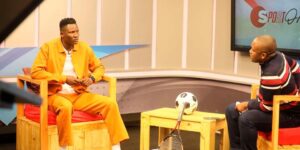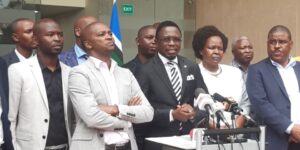Michael Olunga has had to turn down chances to play in Europe in the past.
“The first opportunity was when I was still in High School,” the Harambee Stars captain said in an exclusive interview with NTV’s increasingly popular 10pm Monday night show, SportOn! in an interview last Monday.
The revelation will surprise his East African fans, most of whom publicly desire to see him again try out his skills in one of the world’s top leagues while in his prime.
The former Gor Mahia footballer has mainly been based in Asia, save for a year-long spell in Sweden in 2016 where he scored 12 times in 26 games for IF Djurgardens.
He then had another stint in Spain, at Girona, a year later, where he hardly found play time, and scored three times in 14 appearances. All the goals came in one match.
“I was offered an opportunity to move to France and join Monaco‘s academy. I was still a teenager and had this dream of becoming a pilot. My mother did not entertain the idea,” the 28-year-old adds with a cheeky smile.
Adding: “Looking back at how my career has panned out, I do not regret (turning down that move).”
Based in Monte Carlo, in the Principality of Monaco next to the French Riviera, AS Monaco is one of Europe’s renowned football clubs, boasting a rich history.

The club’s academy is renowned for producing some of the world’s best strikers including David Trezeguet, Nicholas Anelka and Olunga’s role model — Thierry Henry.
Trezeguet and Henry won the Fifa World Cup hosted in France in 1998 before Anelka joined them to clinch the European championship two years later.
It’s because of his admiration for Henry, a pacy striker who lit the world with his skills at the start of this century and won the English Premier League with Arsenal plus Uefa Champions League with Barcelona among other titles, that Olunga dons the number 14 jersey for club and country.
Olunga could also have moved to France later on in his career. There was strong interest from mid-table clubs in 2018 when he was banging in the goals for Japan’s top-flight club Kashiwa Reysol.
A ruthless forward in front of goal, he ultimately managed 58 goals in 72 appearances for Reysol, including eight in a single match against Kyoto Sanga.
“I had a challenging time in Japan but enjoyed my time and was satisfied with my work over there after winning the Most Valuable Player (MVP) award,” he says.

“It was not easy though. The culture in Japan is very different. I was the only person in the team who could speak English. We had a Brazilian coach and he brought with him three players. I was the only foreign based player who was not Brazilian. I had to learn Japanese to fit in.”
Besides France, Olunga’s impressive returns on the pitch in Japan attracted interest from what football fans refer to as the oil money, in the frame of a move to Qatar’s Al Duhail.
The move enabled him link up with some of the biggest names in football, namely Argentine coach Hernan Crespo who starred for Chelsea and Inter Milan during his prime, and Belgium defender Jan Verthongen, formerly Victor Wanyama’s teammate at Tottenham in England.
Monthly salary
Those who claim to be in the know say the transfer was worth Sh800 million, payable to Reysol in exchange for the player’s services, and a monthly salary of Sh6 million, exclusive allowances and bonuses.
“I am so happy with the way Duhail have treated me and I work so hard to produce on the pitch. Kenyan parents believe education is everything but they should allow the kids to exploit all talents be it football, drama or even singing.”
“The initial challenge I had in Qatar was the weather. I left Japan when it was very cold and arrived in Doha to so much heat. I’d played for a whole season (year) in Japan and got to Duhail when they were halfway through the season. That’s why it took time to adjust.”

Some 35 goals in 36 games for Duhail suggests everything is going on just fine in the Gulf and the ex-Tusker and Gor Mahia player who credits famed coach Robert Matano for “giving him a chance in the Kenyan league when he was still in High School” is backing Qatar to host a unique Fifa World Cup which gets underway in less than two weeks’ time.
“Qatar is ready to host the world. I had an opportunity to play in some of the new stadiums. The turf is okay. No player should worry about the heat because the venues are air conditioned.
“I will be heading there to watch some matches and support my teammates” says Olunga.

He further backs Brazil to dethrone France as world champions and Senegal — led by famed striker Saido Mane — as the African country that will impress the most in a pool that also has Morocco, Ghana, Tunisia and Cameroon.
Playing at the top comes with responsibility, Olunga says, and thus advises his compatriots who aim to make it to the top on the football pitch to remain level headed, focused and disciplined.
“The players have to invest time and effort in exchange for success,” he notes.
“It is no longer about training and going home to wait for the match. Everyone I’m playing with or against is talented. So I have to work hard, rest well, and ensure I am well fed and relaxed.
“I watch myself after every match to identify areas that I have to improve on. On match day, I have to check and ensure my urine is clear because I have to be well hydrated. Qatar is hot and on average I lose three litres of water in the game so it is my personal effort to recover that.”
Olunga is relieved the challenges that have dogged Kenyan football for the past year — leading to a Fifa ban — have been resolved, well… almost, following the ceasefire between the President William Ruto’s government and Football Kenya Federation (FKF). This was one of the conditions by Fifa.

“It was always frustrating to remain at my club when my teammates were heading to play for their national team. Very many people were affected and that’s why I wish to thank the sports fraternity led by Cabinet Secretary Ababu Namwamba for the sacrifices made towards getting a solution.
“We missed on the opportunity to play at the 2023 Africa Cup of Nations because of the ban and that time will never be recovered. So we have to try and make up for lost time.”
Post-football plans
Post-football, Olunga, who scored an impressive A minus in his Kenya Certificate of Secondary Education (KCSE), will consider pursuing an Engineering course or even train as a pilot.
He is also actively involved in uplifting the society through his Michael Olunga Foundation Academy (MOFA). “I grew up in Lucky Summer where the youth love football but lack the guidance and infrastructure. MOFA is seeking to impact them positively through Education and skills so we are partnering with schools to educate and mentor the youngsters.”
Olunga lists Manchester United and Chelsea defenders Raphael Varane and Kalidou Koulibaly as the toughest defenders he’s played against.
Real Madrid’s home ground Santiago Bernebeu is the best stadium he’s ever played in, he says, while Dennis Oliech and George Odhiambo “Blackberry” are the local based players he loved watching while growing up.
His favourite goals were — incidentally — all scored while on national team duty. They include the overhead kick versus Tanzania at the 2019 Africa Cup of Nations in Egypt, and the long range shot against Ethiopia at a jam-packed Kasarani stadium.
Credit: Source link